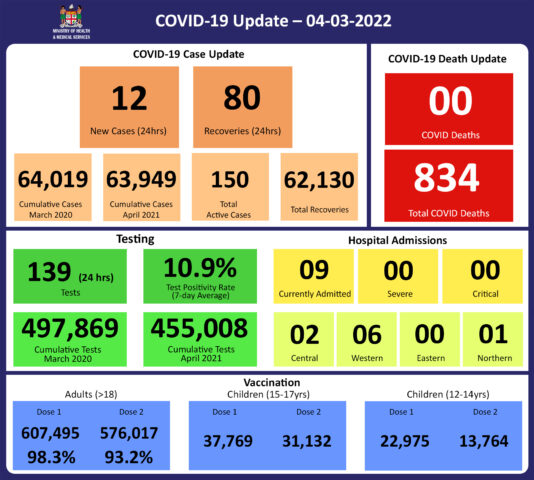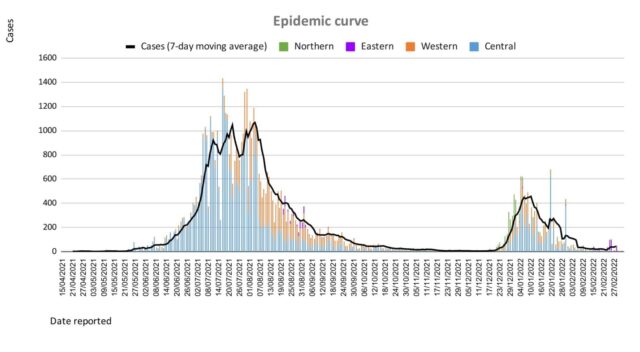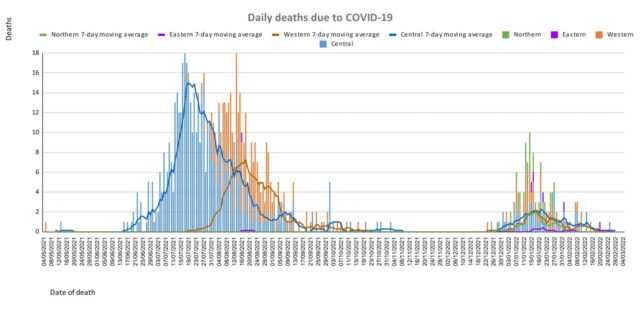COVID-19 Update 04-03-2022
COVID-19 Situation Update
Friday 04th March
Public Advisory:
Leptospirosis, typhoid fever, and dengue fever
As previously mentioned, the recent weather has resulted in conditions conducive to outbreaks of leptospirosis, typhoid, and dengue fever, which are climate-sensitive diseases endemic to Fiji. We are also aware of the recent weather reports predicting increasing rainfall over the next few days, and as such the medical advice we provide needs to be followed, while we continue to mount our public health and clinical response. We have especially noted increasing leptospirosis cases, hospitalisations, and deaths following similar weather events. Please heed our advice to protect yourselves and your loved ones.
Leptospirosis
The Permanent Secretary of Health together with senior advisory managers are currently visiting the Ra sub-division to speculate on the current rising cases of leptospirosis in the division.
Being an infectious disease, there have been 567 confirmed cases of leptospirosis in Fiji so far, with outbreaks occurring in all four divisions.
An increase in the number of cases admitted to hospitals infected with leptospirosis has been noted, with a death toll of 23 since the last update on 23/02/2022.
Although all age groups are able to host the infection, cases remain predominantly higher in ages 10-39-years more in males than females, and in people of the i-Taukei ethnicity.
Prevention
The leptospirosis bacteria is spread to humans through the urine of infected animals, such as cows, pigs, rats, and dogs. To reduce your individual risk, it is important to understand that exposure to animals, soil, mud, and floodwaters during work or recreational activities increases your risk of infection.
Important prevention measures include wearing full covered footwear at all times when going outdoors, avoiding wading or swimming in flooded waters, using clean fresh water to wash up after exposure to muddy waters, and keeping all food and drinks covered and away from rats. For workplaces, practice good personal hygiene at all times, cover cuts and wounds well, and use protective equipment, especially footwear when in flooded and/or muddy areas.
We are also urging all parents and guardians to prevent children from playing in the mud or swimming in flooded rivers or creeks, and ensure that they wear shoes when outside.
Symptoms and treatment
Early treatment can decrease the severity and duration of the disease. Please seek medical care if you have recently had contact with floodwaters, mud, or animals, and develop the following symptoms: fever, muscle pain, headache. You may also have red eyes, loss of appetite, nausea/vomiting, dizziness, or feel weak.
Leptospirosis can be treated with appropriate antibiotic medications prescribed by a doctor if treatment is sought early. Danger signs for severe leptospirosis include shortness of breath, coughing blood, chest pain, yellow eyes/skin (jaundice), signs of bleeding (including unexplained bruising), decreased or increased urination, difficulty staying awake. Severe leptospirosis is life-threatening, and anyone with these symptoms must be taken to the hospital immediately.
Response
In response to the leptospirosis outbreak, the Ministry has mobilized FEMAT, first to Navosa, and now to Ra to assist the local medical teams in providing services and outreach to communities. Awareness messaging has also been distributed to the public through radio, television, print, and social media, focusing on prevention and early healthcare seeking for suspected cases. And our clinicians have had access to continuing medical education sessions remotely, or in person, by our specialist physicians from the divisional hospitals, to promote early diagnosis and treatment of people who may have leptospirosis.
Typhoid fever
There have been 44 cases of typhoid fever in Fiji this year. This is equivalent to the number recorded within the same time period last year.
Typhoid fever is typically found in areas that do not have access to clean drinking water. We strongly encourage people who live in rural areas, informal urban areas, and any other areas where access to clean drinking water is limited, to boil all drinking water. We must all also continue to practise basic hygiene measures such as frequently washing hands with soap and water, especially after visiting the toilet and before eating or preparing food.
Dengue fever
There have been 633 confirmed cases of dengue fever in Fiji so far, which is within the numbers expected for this time of the year.
We continue to urge everyone to get rid of potential mosquito breeding places, such as empty containers inside and outside your homes that may collect water, including discarded tires, flower vases, and pot plant bases. Protect yourself from being bitten by mosquitoes by using mosquito screens in your homes, and mosquito repellants.
COVID-19 Vaccination
As of the 04th of March, a total of 105,295 individuals have so far received booster doses. Members of the public are advised to obtain their booster dose after at least 5 months from their second COVID-19 vaccine dose. Moderna vaccine and Pfizer vaccines are both available for adult booster doses.
The Ministry of Health and Medical Services will continue to monitor the advisories on post-infection immunity based on quality data that is being generated globally
Given the current stocks of Pfizer Vaccine we have we will be using Pfizer for ongoing primary 2 dose schedule of children and adults and as the booster dose.
Supporting International Travel
- Plan to remove 3-day hotel stay for fully vaccinated travellers from Travel Partner Countries.
Since the opening of international travel borders to travel partner countries travellers coming in from Travel Partner Countries have had to undergo an in-country test in Fiji on day 2 of stay in Fiji. To support this requirement, a 3-day hotel stay was mandated to minimize the risk of non-compliance to testing and to ensure that all positive tests were appropriately responded to while the traveller was locatable. To be clear, this 3-day stay in a Care Fiji Commitment (CFC) hotel was never a quarantine. The hotel stay is in place to facilitate the testing requirement on day 2 of arrival.
We have noted that while many countries have removed all forms of traveller sequestration, the in-country testing conditions continue. As such we are supporting current efforts to have more testing sites throughout Fiji to which travellers can book for testing, without requiring a hotel stay, as part of prior approval to come into Fiji. We are working together with the Ministry of Trade and Tourism and Ministry of Economy in the final phase of approving this in-country testing for international arrivals by private entities. These private entities will ensure that the test is available and the results will be reported back to Ministry of Health officials. They will also be mandated to report any international traveller who defaults from the mandatory testing. Any traveller defaulting a test will be subject to legal punitive measures.
- Ongoing Review of Non-Travel Partner Country Status
This ongoing effort is mediated through the Ministry of Commerce, Trade, Tourism and Transport, and the Ministry of Economy (COVID-19 Risk Mitigation Taskforce). Non-Travel Partner Status is assessed and graduated to Travel Partner status based on COVID-19 Transmission Data (cases, admission, and deaths), COVID-19 Community Surveillance data (Test per 1000, positivity rate), and ability to detect Variants (Access to genomic sequence capability). A list of Travel partner countries is available on the following link: https://www.mcttt.gov.fj/home/traveltofiji/international-travel/#b
Last Updated on 2 years by Publishing Team



